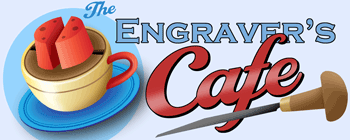Terrezar
Elite Cafe Member
For the last few months I have been reading the forum almost daily, and every now and then I have made a post or a reply. I enjoy reading your posts, and I enjoy seeing your beatutiful work. I also apreciates the sense of compainanship between the members.
However, I musst say that the thing that impresses me the moust is your willingness to share your trics, your experienses, and even a story or two. I belive this to be verry important for the development of the next generation of engravers. The fact that they can get a few trics right away, and that they can see that it isn't only they that struggles in the beginning.
So again, passing information on to the next generation is essensial for the survival of the trade. And if it isn't done we risk loosing valuable knowledge, and a bit of our culture.
I am 19 years old, and I realy enjoy working with my hands. I was also lucky enough to get to work with an elder knifemaker to learn his trade and his secrets. When I asked him if I could learn from him he had allready desided to lay down his work, but he agreed to start up again for a summer to teach me :biggrin:. The summer came and passed and I made tree knives together with him, all in a local and traditional design.
Here you have a link to a picture of them:
http://1.bp.blogspot.com/--KOsTG_CqyQ/UDSWp2XOfXI/AAAAAAAANQQ/weAGiqQjcfE/s1600/IMG_0964x.jpg
The one in the middle and the one to the left is made out of cows horn, and they are all so called Totenkniver, or Toten-knives (to the germanspeaking: nothing to do with death, only the name of a place in Norway.) The old knifemaker who agreed to teach me was the last one to make the traditional cow horn knife, and if he had stopped then it would have ment the end of a two houndred year old tradition. But as I said, I was lucky enough to learn from him, all his tricks and things he had discowered during 35 years of making thise knives. It was indeed amasing, to see the shaking in his hands stopping for a few seconds when he drove a file ower the silver, or seeing him beat metal plates into the exact shape he needed it to be.
My point is: Share, and seek to learn!
My second point is to the people learning: Don't forget were your knowledge comes from. Show gratitude and respect. When I was learning about knifemaking I had told myself not to disagree with anything my master said, and even thoug i ofthen wanted to, his way always worked. Two and a half year has passed, and I have of course changed some things to fit my own style, but I still see my master reguarly and I have gotten to the point were I also have got something to contribute with. He also kept on making knives afther that summer, and he still does.
Thanks, and sorry for the long post. :hammer:
:hammer:
However, I musst say that the thing that impresses me the moust is your willingness to share your trics, your experienses, and even a story or two. I belive this to be verry important for the development of the next generation of engravers. The fact that they can get a few trics right away, and that they can see that it isn't only they that struggles in the beginning.
So again, passing information on to the next generation is essensial for the survival of the trade. And if it isn't done we risk loosing valuable knowledge, and a bit of our culture.
I am 19 years old, and I realy enjoy working with my hands. I was also lucky enough to get to work with an elder knifemaker to learn his trade and his secrets. When I asked him if I could learn from him he had allready desided to lay down his work, but he agreed to start up again for a summer to teach me :biggrin:. The summer came and passed and I made tree knives together with him, all in a local and traditional design.
Here you have a link to a picture of them:
http://1.bp.blogspot.com/--KOsTG_CqyQ/UDSWp2XOfXI/AAAAAAAANQQ/weAGiqQjcfE/s1600/IMG_0964x.jpg
The one in the middle and the one to the left is made out of cows horn, and they are all so called Totenkniver, or Toten-knives (to the germanspeaking: nothing to do with death, only the name of a place in Norway.) The old knifemaker who agreed to teach me was the last one to make the traditional cow horn knife, and if he had stopped then it would have ment the end of a two houndred year old tradition. But as I said, I was lucky enough to learn from him, all his tricks and things he had discowered during 35 years of making thise knives. It was indeed amasing, to see the shaking in his hands stopping for a few seconds when he drove a file ower the silver, or seeing him beat metal plates into the exact shape he needed it to be.
My point is: Share, and seek to learn!
My second point is to the people learning: Don't forget were your knowledge comes from. Show gratitude and respect. When I was learning about knifemaking I had told myself not to disagree with anything my master said, and even thoug i ofthen wanted to, his way always worked. Two and a half year has passed, and I have of course changed some things to fit my own style, but I still see my master reguarly and I have gotten to the point were I also have got something to contribute with. He also kept on making knives afther that summer, and he still does.
Thanks, and sorry for the long post.
Last edited:






